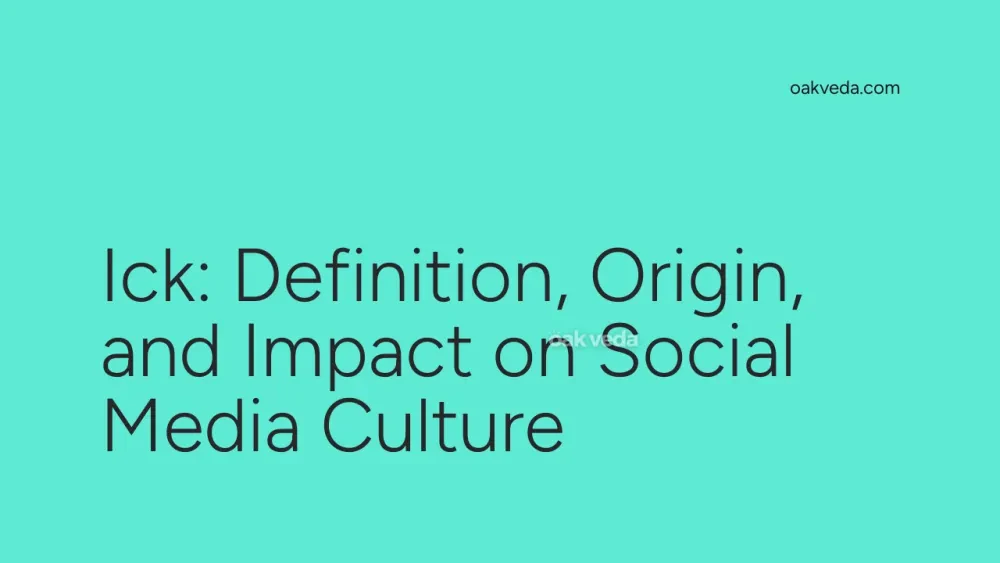
What is "Ick"?
"Ick" is a popular slang term used across social media platforms to express a sudden feeling of disgust or revulsion towards someone or something, particularly in romantic or social contexts. This visceral reaction, often referred to as "getting the ick," can be triggered by seemingly insignificant actions, behaviors, or characteristics that inexplicably turn someone off.
Origin and Development of "Ick"
While the word "ick" has long been used to express disgust, its current usage in social media contexts gained significant traction in the late 2010s. The term's popularity exploded on platforms like TikTok, Twitter, and Instagram, where users began sharing their personal "ick" moments, often with a humorous twist.
The concept of "the ick" in romantic situations was notably popularized by the British reality TV show "Love Island" in 2017, where contestant Olivia Attwood used it to describe her feelings towards a fellow contestant. Since then, it has become a staple in online discussions about dating and relationships.
How "Ick" Works in Social Media
On social media, "ick" functions as a shorthand way to communicate complex emotional responses. Users often employ the term in various formats:
- Standalone comments: "Ick" or "That's an ick for me"
- Hashtags: #ick or #theick
- Memes and reaction GIFs
- TikTok videos and Instagram Reels sharing personal "ick" stories
The term's versatility and relatability have contributed to its widespread adoption across different demographics and social media platforms.
Types or Variations of "Ick"
While the core meaning of "ick" remains consistent, it can be applied to various situations:
- Dating Icks: Related to romantic interests (e.g., "He chews with his mouth open. Ick!")
- Social Icks: Pertaining to friends or acquaintances' behaviors
- Celebrity Icks: Public figures' actions that fans find off-putting
- Brand Icks: Marketing or PR moves that backfire and repel consumers
Popular Examples of "Ick" on Social Media
- TikTok challenges where users share their biggest "icks"
- Twitter threads compiling relatable "ick" moments
- Instagram meme accounts dedicated to "ick" content
- YouTube compilations of celebrities giving people "the ick"
Impact of "Ick" on Social Media Culture
The proliferation of "ick" content has significantly influenced online discourse:
- Increased Vulnerability: Users feel more comfortable sharing personal turn-offs and experiences.
- Humor as a Coping Mechanism: "Ick" often serves as a lighthearted way to discuss dating frustrations.
- Community Building: Sharing "icks" creates a sense of camaraderie among users with similar experiences.
- Changing Dating Dynamics: Awareness of common "icks" may influence behavior in romantic interactions.
Controversies Surrounding "Ick"
While generally seen as harmless, the "ick" phenomenon has faced some criticism:
- Promoting Judgmental Behavior: Some argue it encourages nitpicking and unrealistic standards in relationships.
- Potential for Bullying: When directed at specific individuals, "ick" content can be hurtful or cross into cyberbullying territory.
- Oversimplification of Emotions: Critics suggest that labeling complex feelings as "ick" may hinder deeper emotional understanding.
How Brands and Influencers Use "Ick"
Savvy marketers have incorporated "ick" into their social media strategies:
- Relatable Content: Brands create "ick"-themed posts to connect with younger audiences.
- Product Positioning: Some products are marketed as solutions to common "icks" (e.g., hygiene products).
- Influencer Collaborations: Partnering with creators to produce "ick"-related content that subtly promotes products or services.
- Engagement Tactics: Brands use "What's your biggest ick?" prompts to boost comments and interactions.
Future Trends Related to "Ick"
As social media evolves, so too will the use of "ick":
- Expanded Vocabulary: New variations or related terms may emerge to express nuanced "ick" feelings.
- Cross-Platform Integration: "Ick" content may become more seamlessly shared across different social media platforms.
- AI and Personalization: Future dating apps might use AI to filter out potential matches based on users' stated "icks."
- Academic Interest: The "ick" phenomenon may attract more scholarly attention in fields like sociology and psychology.
FAQs about "Ick"
-
Is "ick" only used in romantic contexts? No, while it's common in dating discussions, "ick" can apply to any situation that causes sudden disgust or aversion.
-
Can you overcome an "ick"? Yes, many people report that "icks" can be temporary and may fade with time or as they get to know someone better.
-
Is experiencing an "ick" a sign of a doomed relationship? Not necessarily. While persistent "icks" might indicate incompatibility, occasional "icks" are normal and can often be addressed through communication.
-
How can brands avoid giving customers the "ick"? Brands should focus on authenticity, avoid trying too hard to be trendy, and be mindful of potential cultural insensitivities in their marketing efforts.
-
Is "ick" a gendered term? While initially more popular among women, "ick" has become widely used across genders in social media contexts.
The "ick" phenomenon showcases how social media can rapidly popularize and evolve language, creating new ways for users to express complex emotions in concise, relatable terms. As it continues to shape online interactions, "ick" remains a fascinating example of digital culture's impact on modern communication.
You may be interested in:
- L (Loss) in Social Media: Definition, Origin, and Impact
- Social Media Analytics: Definition, Origin, and Impact
- CapCut: Definition, Origin, and Impact on Social Media
- Viral: Definition, Origin, and Impact on Social Media
- Linktree: Definition, Origin, and Impact on Social Media
- Retweet: Definition, Origin, and Impact on Social Media

